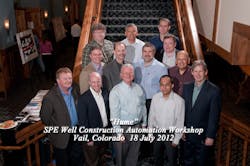OPC UA Value Proposition for the Oil and Gas Industries
OPC is widely adopted and accepted in industrial automation. With the introduction of OPC Unified Architecture (OPC UA), the OPC Foundation saw the opportunity to expand into a multitude of related domains. The OPC UA information modeling companion specification architecture presents opportunities for collaboration to expand adoption in industrial automation and related domains, and provides the mechanism for information integration. For example, a companion specification was developed for analyzer devices, and there is ongoing development work on companion specifications for FDI and for S95.
Last year I started engaging very proactively in the oil and gas arena. Initial work a number of years ago started as a feasibility analysis with respect to integrating one of the upstream data information standards called PRODML into the OPC UA framework as a companion specification.
Earlier this year, the executive leaders from each of the eight standards organizations most crucial to the oil and gas industry met to form the Standards Leadership Council. The organizations include Energistics, MIMOSA, PIDX International, POSC Caesar Association (PCA), Professional Petroleum Data Management Association (PPDM), The Open Geospatial Consortium (OGC), The OPC Foundation, The Pipeline Open Data Standard Association (PODS), SEG The Society of Exploration Geophysicists.
On June 28, 2012, the Standards Leadership Council hosted an historic event. All eight standards organizations were present in Houston, Texas, for a one day-workshop. Over 100 people had the opportunity to discover what each of the organizations is doing, and the workshop provided a forum for working together to enhance the value proposition to all the organization’s members. Check out the information at the Standard Leadership Council for more information. Plans are in place to continue proactively working together to streamline the organizational dynamics between the standards organizations.
In July, 2012, the Society of Petroleum Engineers hosted an event in Vail, Colorado, called: Well Construction Automation—Preparing for the Big Jump Forward. OPC Foundation conducted a half-day session at the event focused at interoperability and developing system automation. Jim Rogers from Apache Corp. and I were the chairpersons of a six-person session that discussed lessons learned from industrial automation that could be applied in well construction automation. This was a unique opportunity to network and provide information exchange between owner operators, industrial automation suppliers and end-users, and the many oil and gas companies that are pursuing the increased use of automation in well construction. Plans are in place for further networking events as part of the DSATS working group, in which OPC Foundation is a charter member.
2012 has also been a banner year for MDIS. This is an effort to streamline what is known as master control systems and distributed control systems information integration and interface standardization. A large number of key industry players including subsea controls, topside specialist and oil companies have been participating, networking and collaborating as part of the development of a standardized MCS -- DCS interface. OPC UA and EtherNet/IP have been selected as “protocols” to be used for the MDIS standard.
In summary, OPC Foundation has been very active in the oil and gas arena, including facilitating opportunities to increase automation in well construction, actively engaging in subsea standardization, streamlining adoption in distributed control systems, and pursuing information integration with the multitude of upstream oil and gas standards.
OPC provides the technology infrastructure and the business value proposition to facilitate other standards organizations’ collaboration activities. While the oil and gas domain is one of the major opportunities, there are a number of other ongoing initiatives. I encourage you to check out the OPC Foundation website for more information on the topics of OPC integration with building automation, machinery optimization and machine tool connectivity for example.
I welcome your comments and feedback! Tom Burke, President and Executive Director, OPC Foundation

